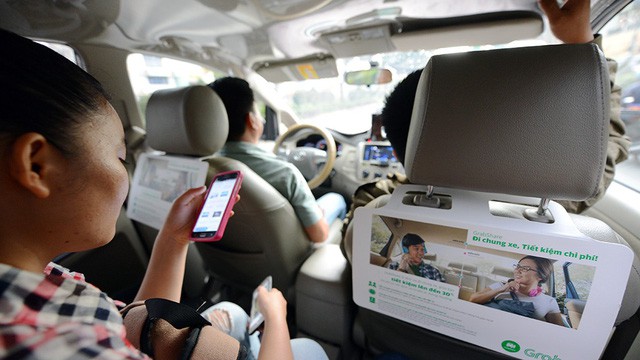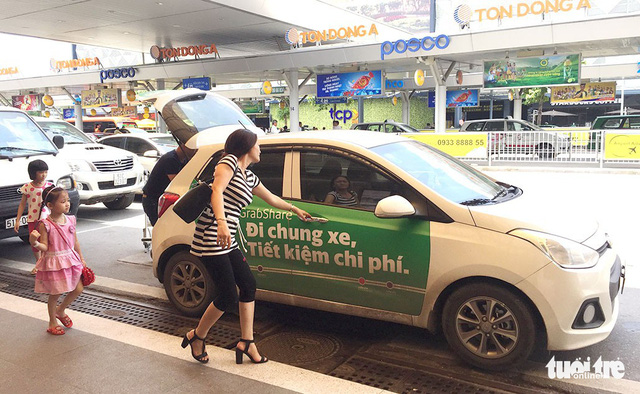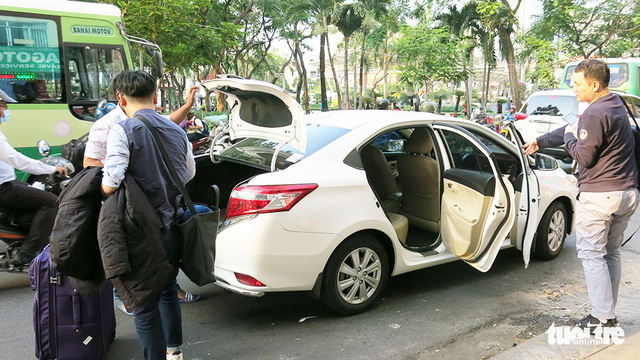Vietnam’s transport ministry has long been determined to subject ride-hailing apps to the same regulations as traditional taxicabs, but has been struggling to put forward feasible solutions to do so.
While ink continues to spill over the war between tech-based transportation services and conventional taxis in Vietnam, the transport ministry is looking into a new set of rules to regulate Grab and Uber, both seen as a thorn in the eyes by local taxi operators.
Vietnam currently regulates the operations of car-based transportation companies through Decree No.86, with the transport ministry tasked with managing the incorporation of ride-hailing apps into the fold.
Grab and Uber are currently permitted to operate in selected provinces and cities under a pilot scheme to study how they should be regulated.
“The whole society is looking forward to the amended decree as it will put an end to the pilot program,” Minister of Transport Nguyen Van The said at a meeting held on Thursday’s to discuss amendments to Decree No. 86.
 |
| A woman looks at her smartphone aboard a Grab car in Ho Chi Minh City. Photo: Tuoi Tre |
The minister began the discussion by underlining that Uber and Grab operations are basically the same as conventional taxis, and the only difference is the use of technology in connecting drivers with passengers.
“This means we should amend [Decree 86] in a way that will regulate Uber and Grab in the essence that they are taxi firms,” he said.
The amended rule should request that the companies behind the apps be responsible for their drivers and passengers, as well as fulfill their tax obligations, according to the minister.
The also admitted that the pilot scheme has had several drawbacks, such as regulators’ failure to oversee the number of cars registered to drive with tech-based taxi services, which has become a major contributor to traffic congestion in big cities.
“There are nearly 37,000 Grab and Uber cars in Vietnam at present, many of which were bought with bank loans leaving the drivers now heavily indebted,” he said.
The problem is that Uber and Grab can expand their fleets as much as they wish, while conventional taxi companies can only deployed a restricted number of vehicles.
The added that the amendment should make sure that the app operators pay taxes for their operations in Vietnam, otherwise they should leave the country.
 |
| A woman enters a Grab car at Tan Son Nhat International Airport in Ho Chi Minh City. Photo: Tuoi Tre |
Speaking to representatives of different agencies tasked with drafting the amended Decree No.86, the minister questioned whether Uber will follow the rules through its own accord despite having no legal entity in Vietnam.
Like Grab, Uber only operates a representative office in Vietnam and all of its revenue is channeled directly to its parent firm in the Netherlands.
Tran Quang Binh, head of the transportation department under the Directorate for Roads of Vietnam, said all ride-hailing apps should register to operate as transportation businesses in the country and put open a headquarters in a Vietnamese locality.
However, as Uber and Grab are currently 100 percent foreign invested companies, they will not be allowed to register as a transportation firm unless they form a joint venture with local partners and hold no more than 51 percent of the stake, according to the current laws.
In conclusion, Minister The ordered that relevant agencies speed up their efforts in drafting the amendment, particularly in getting more feedback from the public.
Like us on Facebook or follow us on Twitter to get the latest news about Vietnam!


















































